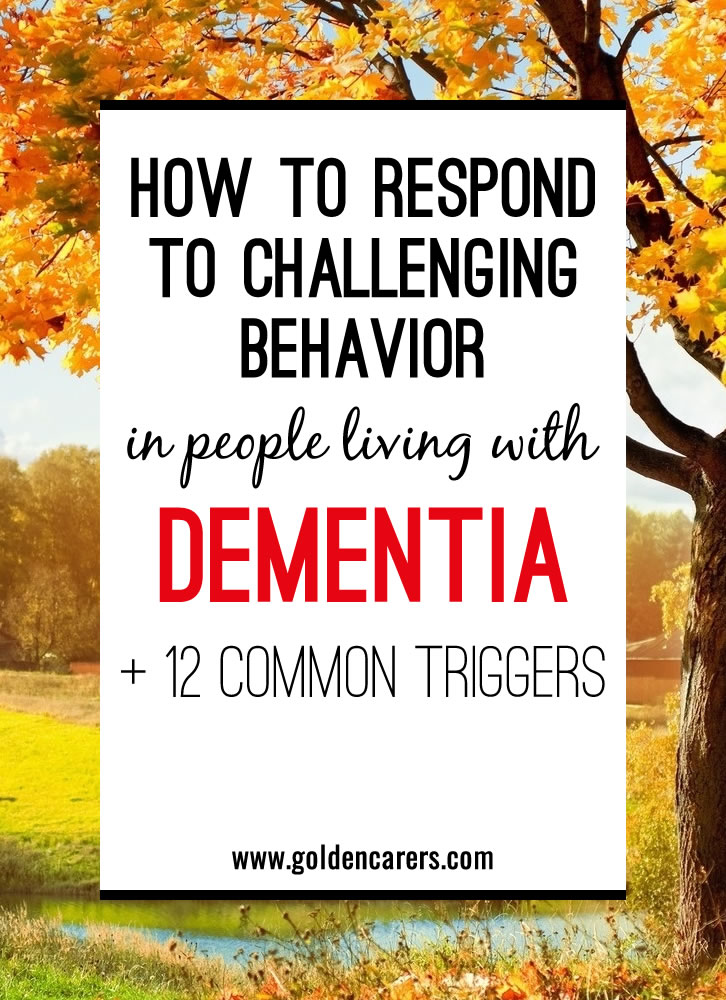SaveDownload16 Comments | ShareTweet
Found In: ›Activities ›Articles ›Alzheimer’s & Dementia

This is one of many free activities.
Golden Carers has 1000s of activities and resources for senior care.
Caring for people living with dementia poses many challenges. As the disease progresses, personality and behavior changes often occur.
Challenging or concerning behavior is used to describe behavior that interferes with a person’s daily life. It is common in people living with dementia and is considered one of the most difficult issues facing staff in residential care and caregivers at home.
Challenging behavior is distressing for both the person exhibiting the behaviour and for those that care for them. It is important to try and understand why the person is behaving in a particular way and remember that it is the behavior that is challenging and not the person.
Related: 10 Communication Strategies for Dementia Care
10 Common Behavioral Problems
Common behavioral problems for people living with dementia include:
1. Catastrophic reaction
Over-reaction to trivial matters; this may result in weeping, screaming or unreasonable accusations.
2. Repetitive behaviour
Compulsion to follow relatives or staff asking the same questions over and over.
3. Hoarding
Hoarding all sort of items for safe keeping. Often accusing others of stealing their precious possessions.
4. Inappropriate sexual behaviour
Loss of inhibitions and the consequent lack of awareness of the rules of appropriate behavior.
5. Aggressiveness
Physical (pushing, hitting) or verbal (abusive language)
6. Paranoia/Suspicion
Often suspicious of staff and neighbours; they imagine that people are plotting against them.
7. Wandering
Aimless or purposeful wandering that can result in getting lost, leaving a safe environment or intruding in inappropriate places.
Related: How to manage wandering behaviour
8. Restlessness
Pacing and fidgeting; this could be due to thirst, pain, medication side effects or even boredom, stress, noise, lack of exercises.
9. Screaming and shouting
Calling out continuously or weeping and whimpering for extended periods of time. (Sometimes this behaviour is a result of brain damage or hallucinations and medical assistance is needed)
10. Sundowning
An end-of-day confusion and restlessness that manifests as dusk approaches.
Related: 14 Ways to Manage Sundowning
Understanding the Person Behind the Dementia
The more you know about the person with the challenging behavior the more likely you are to understand them. Assessment of the behavior should be functional and comprehensive. It should include:
- Time of the behaviour
- Frequency
- Intensity
- Duration
- Identification of triggers and the likelihood of environmental aspects that could or would escalate the behavior.
12 Common Triggers to Challenging Behavior
Sometimes problematic behaviors are caused by changes in the brain as dementia progresses and sometimes by triggers in the environment. Triggers could include:
- Anxiety
- Feeling frightened
- Dehydration
- Fatigue
- Frustration
- Insomnia
- Physical discomfort
- Pain
- Inappropriate environment (noisy, crowded room, chaotic gathering)
- Depression
- Medication
- Illness

10 Ways to Respond to Challenging Behavior
- Approach in a calm, respectful manner.
- It is best not to touch the person by leading or holding their arms; it may aggravate the situation. Instead talk in a consoling and empathetic manner and offer your arm: “Here, take my arm, let’s go to the dining room/bedroom/veranda.”
- Try not to over-react even if the behavior is embarrassing; remember that it is the illness causing the behavior.
- Avoid arguing; remember the person is not deliberately trying to upset you. Their logic and reasoning are impaired by the illness and it is up to you to comfort and reassure them.
- Be flexible; if the behavior is about a shower they don’t want to have, leave this task for later when the person has calmed down.
Related: Communication Board for Dementia Care - Observe the person and what their body language is conveying. Give them time to calm down while offering solace.
- Validate their feelings. If a 95 year old man is very agitated ands asks you whether you have seen his mother it is no use to point out to him that she is dead. Go along with him, say something like: “No, I haven’t seen her. Was she a great cook? What did she cook that you loved?”
- Be mindful and ‘in the moment’. If you are talking to the person and your thoughts are elsewhere there is a good chance you won’t get the best result. Often your body language and demeanor will speak louder than your words. Use a soft tone of voice and some physical touch to add emphasis to the communication.
- Offer a distraction such as a walk or a board game.
Related: Games for People Living with Dementia - When you identify a strategy that works, write it down so other staff can use it too.
Understanding what may be causing the challenging behavior and learning how to respond to it will enable carers to take control of situations when they arise and diminish the occurrence the behavior.
Related: Goal-Directed Behavior
10 Best Care Practices
People living with dementia that exhibit challenging behaviors are trying to communicate needs that have not been met.
Cultivating work practices to treat the individual and not just the illness for best results.
Related: Person-Centred Care
- Implement individually tailored, flexible routines.
Related: 15 Activities for Late-Stage Alzheimer’s - Recognize that it is important to get to know the person beyond the diagnosis.
- Remember that nutrition and hydration are important factors.
- Aim to reduce anti-psychotic medication wherever possible.
- Strive to anticipate concerning behaviors.
- Schedule activities that promote creativity and satisfaction.
Related: The Benefits of Coloring-in for the Elderly - Provide guidance and reassurance with compassionate overtones.
- Implement behavior management strategies with an emphasis on dignity and respect.
- Gentle touch and physical contact is important and can reduce fear and anxiety.
Related: Tips for One-on-One Visits with Seniors - Ensure there is a collaborative partnership between carer and patient.

